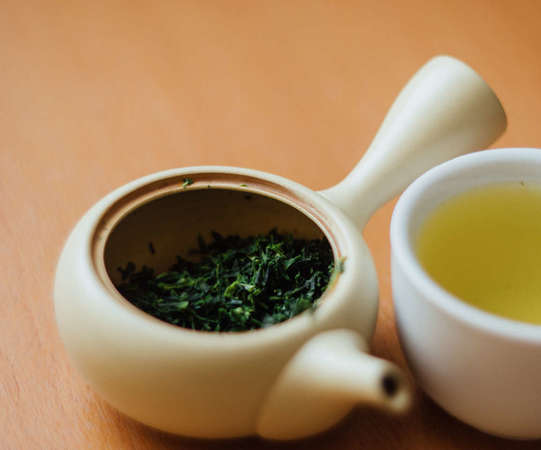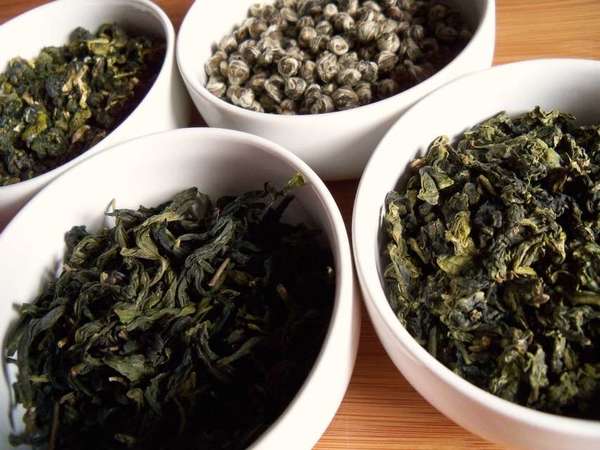Health Benefits of Tea
Wikipedia: Health_effects_of_teaLast Updated: Jul. 3, 2017
 Photo of Leaf of Sencha from Kawane, Oku-hikari cultivar from Thés du Japon by Etienne FAT, © Etienne FAT, CC BY 2.0
Photo of Leaf of Sencha from Kawane, Oku-hikari cultivar from Thés du Japon by Etienne FAT, © Etienne FAT, CC BY 2.0Here, we strive to provide an impartial resource that reviews the scientific literature on tea and provides direct citations to research on the health effects of tea. While reading this page, it is important to remember that tea is primarily a beverage, not a medicine.
Here are some of the more well-established benefits of tea drinking:
- Concentration - Tea contains caffeine, and also L-theanine, which seem to interact to promote alertness and concentration. This is the primary benefit of tea drinking, the most immediately noticeable one.
- Antioxidants - Tea is rich in antioxidants, called flavonoids. These chemicals are often implicated in some of the potential health benefits of tea, although it is not entirely clear the degree to which they actually promote health or provide direct benefits.
- Nutrition - Tea is virtually calorie-free and contains a variety of micronutrients, including both vitamins and minerals. Tea contains significant amounts of folate, trace amounts of choline, and green tea (but not black) contains some Vitamin C. Tea also contains potassium, magnesium, and a large amount of manganese.
- Preventing heart disease - According to the Linus Pauling Institute's review of the scientific literature, there is evidence that tea consumption, especially consumption of 3 cups daily, provides a small but significant reduction in the risk of heart disease. However, there are still many unanswered questions and conflicting results surrounding tea and heart disease.
- Antimicrobial activity - Chemicals from green tea were found to inhibit the replication of the influenza virus.[1] It is not clear the degree to which this effect would actually translate into drinking tea having any anti-viral effects.
- Sleep Benefits - Tea disrupts sleep less than coffee, and many teas have a high concentration of L-theanine, which promotes relaxation and plays an important role in sleep.
- Relaxation / Stress reduction - There is evidence that drinking black tea reduces stress and promotes relaxation;[2] stress is known to have many negative impacts on the body, whereas relaxation promotes healing and overall good health.
These benefits are suggested, not proven, by science. Much of the evidence supporting the supposed health benefits of tea comes from animal studies or epidemiological studies (surveys of large populations). This type of evidence is much weaker than the evidence from carefully controlled studies with large sample sizes. Science also requires repeated replication of studies, and subjection of studies to scrutiny and analysis, before something can be established as "proven".
 Photo by A Girl With Tea, © A Girl With Tea, CC BY 2.0
Photo by A Girl With Tea, © A Girl With Tea, CC BY 2.0Are some kinds of tea healthier than others?
Yes and no. Many tea companies and health websites make claims that green tea or white tea are healthier than black tea, claiming that they have more antioxidants and less caffeine. This is not necessarily true. One study measured the antioxidant content of 77 different teas, including black, green, white, oolong, and herbal teas. The study found a huge variability in antioxidant content and caffeine content from one tea to the next, even within each category (green, black, etc.). These differences were much larger than average differences between the various categories.[3]Among teas, green tea has received the most attention with respect to discussion of the health benefits of tea. This focus is due largely to a historical accident, which became reinforced by a supplement industry looking to profit from the surrounding hype. Japan has been the country to lead the way in terms of scientific research into the health benefits of tea, and the Japanese drink almost exclusively green tea. As such, discussion about the health benefits of green tea, which often cites studies referencing green tea, can be highly misleading. Most of these studies do not compare green tea to other types of tea, and the few studies that have been conducted have failed to come up with any strong evidence that green tea (or any type of tea) is universally healthier than other types.
Health risks and drawbacks associated with tea
Too much of a good thing is often not good for you, and tea is no exception. Tea contains caffeine, which in excess can contribute to a number of health problems, including anxiety and insomnia.Tea may also inhibit iron absorption, although this effect is not a matter of concern for most people. The effects of tea on iron absorption are complex, but both tea and various herbal teas can inhibit the absorption of non-heme iron sources (plant sources—animal sources of iron are unaffected).[4] This effect is strongest when the tea is consumed together with a meal containing plant sources of iron.
Tea extracts and supplements are less safe than drinking tea
Tea extracts or supplements, typically consumed as green tea extract, pose additional health risks and are considerably less safe that tea as a drink. These extracts can cause nausea and in some cases, liver damage.Health benefits of herbal teas
Herbal teas are not made from the tea plant and their health benefits are best considered separately from that of true tea. However, RateTea has compiled a lot of health-related information on the pages for individual herbal teas, such as chamomile, lemongrass, mint, rooibos, and tulsi or holy basil. Like tea, many herbal teas are rich in antioxidants. However, many herbs have other benefits and, in some cases, health risks.References
1. Mikio Nakayama et al. Antiviral effect of catechins in green tea on influenza virus, Antiviral Research, Vol. 68, No. 2, Nov. 2005, pp. 66-74.
2. The effects of tea on psychophysiological stress responsivity and post-stress recovery: a randomised double-blind trial , Psychopharmacology, Vol. 190, No. 1, Jan. 2007.
3. M. Friedman et. al. Distribution of catechins, theaflavins, caffeine, and theobromine in 77 teas consumed in the United States, Journal of food science, 2005 Nov-Dec, v. 70, no. 9, p. C550-C559.
4. Richard F. Hurrell et. al., Inhibition of non-haem iron absorption in man by polyphenolic-containing beverages, British Journal of Nutrition (1999), Vol. 81, pp. 289-295.
Further Reading:
U. Maryland's Reference on Uses of Green Tea in Complementary Medicine - Well-referenced with numerous citations to recent scientific studies.
Linus Pauling Institute's Page on Tea - Comprehensive and well-referenced summary of the health effects of tea.

